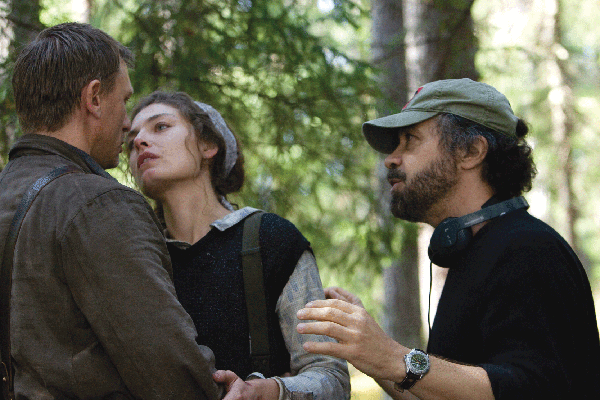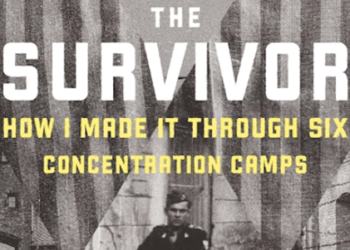‘Defiance’ director Ed Zwick chronicles Nazi resistance in the woods of Belarus
By CURT SCHLEIER
They came to the Museum of the Jewish Heritage from as far away as Australia. Ostensibly, the reason was to see a screening of “Defiance,” the new Ed Zwick movie about the Bielski Brothers. But truth be told, the film was just an excuse to gather. They really came to see each other and celebrate life.
The three Bielskis were resistance fighters who saved 1,200 Jewish lives. They lived and fought from various base camps in the woods of Belarus, and on a cold November evening the auditorium was filled with survivors of those three years and their families. Four generations of the Chonon family were there, led by patriarch Charles, who spent two years in the woods. Joseph Pian came from Sydney to honor the memory of his mother, Fruma.
In his introductory remarks, Robert Bielski, son of Tuvia, the group’s leader, said it best: “We are family,” forever bound by that experience. As Bielski called the roll of those gathered, survivors rose slowly, many needing assistance from younger relatives.
Several weeks later, Zwick, 56, talked about the special memories he has of that day.
“Imagine having gone through that,” he said. “I spent the day with them and I shot a set of portraits of all of them. I was touched by their spirit. I noted that they were remarkably hearty and resilient. When I was shooting the portraits, I thought they would pose pensively, but they were any number of other things, including joyous.”
The idea for the film actually originated with screenwriter Clayton Frohman. The two were friends and, in fact, both their grandfathers were founders of Beth-El, the conservative temple in Winnetka, Ill., where they grew up.
Frohman saw an obituary of Tuvia in the paper. He’d never heard of the Bielskis or for that matter any Jewish resistance other than the Warsaw Ghetto uprising. Subsequently, he read the definitive book on the subject (on which the film is based), “Defiance: The Bielski Partisans,” and was so impressed he gave his copy to Zwick.
“Clay showed it to me,” Zwick remembered. “He already had the idea of a film in the back of his mind. But my initial response was, Do I really want to make another movie about the Holocaust? I’d read a great deal about it and couldn’t imagine what I could add to the great cannon of literature and film.”
But once he read the book, that changed. There were the great story lines: action, violence, sex, sibling rivalry all rolled into one. But, as important, “Defiance” provided an opportunity to point out that not all Jews went quietly into the night.
Zwick is extremely well spoken. He responds to questions in complete paragraphs, as though he knows what’s coming and has prepared rehearsed answers in advance. The only time this changes is when a reporter mentions he always believed that the Jews were too passive, and that contributed to their deaths,
“Well, maybe you should read your history,” he retorted, his voice sharp, almost angry. “Obviously, that’s a false impression.”
Then his speech quickly resumed its normal modulation and he continued: “There was confusion about why there weren’t more indications that Jews fought back. In Bialystock, Vilna, in every ghetto, in every shtetl, every place there was an opportunity, there was resistance and revolts. Even in the camps.
“There was always the impulse to resist, but you have to understand all of the complexities. They were a stateless people. They had no weapons. All of their neighbors were often hostile and the local police often operated against them.
“That said, there were all sorts of instances of Jews going into the woods and joining partisan brigades. The fact is there was an impulse to resist.”
Zwick recalled adults in his house talking about the Holocaust.
“Most of these conversations came when we were out of earshot and they thought the kids were not listening,” he said. “I remember interviewing my grandfather before his death and he spoke about coming here and leaving his brothers and sisters who never made it out.”
And that in part is why he believes the Bielskis and other Jewish partisan groups are so little known: Many of the survivors put their war experiences behind them and rarely mentioned them to their children.
Zwick is also the director of such memorable films as Glory, The Last Samurai and Blood Diamond. His company produced Traffic and Shakespeare in Love as well as the seminal TV series thirtysomething.
And, yes, he says, they are all his babies. But clearly Defiance was a little different.
“As an artist, you’d like to think that you vest yourself personally in everything you do and that’s necessary,” Zwick said. “But to be there in Eastern Europe was to imagine how but for an accident of birth and a generation I could well have been someone in this circumstance.
 “By extension, I wonder what would I have done? How would I respond? Would I have made it through the winter in the woods?”
That need for introspection infected the entire cast.
“We would all talk about it together,” Zwick said. “Whether it was Daniel Craig, who is not Jewish, or Liev Schreiber, who is. All of us together plunged into this and were very aware of our setting. You cannot not be in the Lithuanian forest (where the movie was filmed), where 300,000 Jews were killed, and not be affected. We could be shooting one day and discover we’re near where an unmarked grave was discovered.”
Zwick is not unmindful of stories that have circulated that the Bielskis were murderous thugs. Certainly they weren’t choirboys, and Zwick himself shows instances of violence — the local police officer who killed the Bielskis’ parents is killed along with members of his family, a Jew whose actions threaten the safety of the community is also murdered – that taken out of context might today be perceived as cold-blooded.
But as for mass atrocities, “That’s been debunked so many times. Even the Institute of Remembrance (the Polish quasi-governmental agency investigating World War II and Soviet occupation brutality), even they are now saying that there is little evidence that the Bielskis (committed atrocities). I think it’s part of a conspiracy, also in Lithuania, in which they are trying to charge Jewish partisans while few if any Poles or Lithuanians were charged with war crimes.”
If the survivors are any indication, the film has Oscar written all over it. Chonon’s review: “Whatever you saw was only 1/10 of 1 percent of what happened. Everything is the truth.”
And isn’t truth what every artist pursues?
***
“Defiance” opens in local theaters on Jan. 16.
Â
Update:
Minnesota Public Radio’s Euan Kerr reported last week on Minnesota’s link with the Bielski brothers: Jack and Rochelle Sutin, who were partisans in the Polish forest during the war and now live in suburban Minneapolis.
An exemplary Shoah memoir, Jack and Rochelle: A Holocaust Story of Love and Resistance (Graywolf Press) was published in 1995; the popularity of the work prompted to publisher recently to re-issue the title.





















